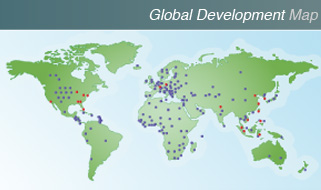-
“If voting changed anything, they’d make it illegal.”
(Emma Goldman)
Posted November 12, 2012
While I am not in the habit of quoting anarchists, I think Ms. Goldman’s observation may be particularly apt as we awake this Veteran’s Day holiday to a political landscape that is surprisingly unchanged. The American electorate has once again spoken with a fractured voice. A Congress with the lowest approval ratings (well deserved) in the history of approval ratings has been returned to the Hill almost unchanged. And a president and Senate of the opposite party, thought to be in disarray, have also been told to go back to work.
Elections have consequences (we are repeatedly told) and despite the appearance of “status quo,” I believe this election will in fact have consequences. The Republican majority in the House is not monolithic in their aversion to compromise. They held their adversarial stance together under the guise of a national election and failed to receive a reward for it. I believe there are ample numbers of Members, who freed from this artificial discipline, will now work across the aisle to help craft the kind of compromise and common sense solutions required. The terror of the Tea Party running candidates to their right in primaries will fade as the reality of the President’s reelection and the urgency of the issues at stake sets in.
Yet sadly, it’s hard to see what the consequences of this election will be with respect to the myriad of serious health issues which affect our Veterans and active duty servicemen and women.
As the wars in the Middle East wind down and the troops are withdrawn, we are still struggling to address the physical and mental health issues of those who have served. During this campaign (and every campaign), both sides parroted their insistence on providing this care. Yet if you talk to the soldiers caught up in the system, many feel it is an adversarial experience. How is it possible that soldiers who put their life on the line to protect and serve this country are faced with a whole new battle, one they are not trained for, just to receive the adequate care and healing they deserve?
Accurate numbers are hard to come by, but most people in the field believe that at least 500,000 soldiers have been exposed to brain altering concussions or trauma; all of which are leading to a flood of post traumatic stress disorder and related conditions. Suicides are at record levels among the active military, as is divorce, abuse and violent crime. The cost in suffering to these soldiers and their families and friends is incalculable. The cost for care is not. And therein lays the root of the problem. Who will bear this enormous cost? And where will the money come from?
There are no easy answers of course. But one thing is clear; an entirely new generation of treatments is going to be necessary. The entire field of mental health seems singularly unprepared for this bright light moment. Both the VA and the DOD are now trying to figure out how to go about addressing this problem.
Neuralstem’s small molecule drug development program is aimed at developing just such a new generation of treatments for traumatic brain injury and the psychiatric diseases that flow downstream, or arise from other sources. At Neuralstem we are proud to be spearheading an entirely new approach to neuropsychiatric conditions, which looks at them as neurodegeneratively based; a physical phenomenon resulting in atrophy of the hippocampus. We believe such hippocampal atrophy is at the heart of many psychiatric and cognitive deficits. Our goal is not merely to treat the symptoms, but to slow down, halt and reverse the “damage” if possible with our new class of drugs that is specifically neurogenic in the human hippocampus.
We are currently treating MDD (Major Depressive Disorder) patients in an FDA approved phase 1b trial. We should complete this trial in the first quarter of 2013. It is too early to know if our novel approach is going to work, but the sign posts are there to read. The animal data in depression models that enabled the trials is very encouraging. Not only do we see functional improvement, but we see an increase in hippocampal volume. This is what we are trying to replicate in humans. Drug trials for such large unmet medical needs are of course lengthy and expensive. That in turn is why we are aggressively seeking an industry partner to develop this program. No one can predict the timing or outcome of such partnership discussions, and in the end much will hinge on the human data that comes out of our trial. But I can report at this time, that there is serious interest from potential partners that have the resources and appetite to push the program forward on multiple fronts.
So as you celebrate the Veteran’s Day holiday, please remember the sacrifice and the need in any way you see fit. There are any number of fabulous groups out there running programs that need your support. A simple Google search will turn up more alternatives than you will be able to vet. At Neuralstem we are pushing as hard and as fast as we can to find out if our own unique, novel approach can help.






